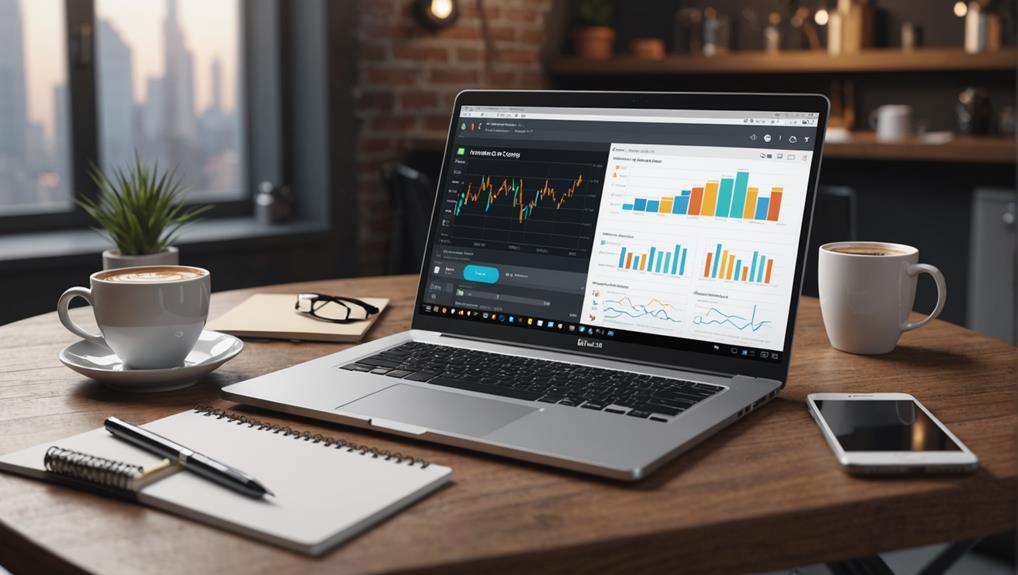
To measure SEO with social media metrics, you'll want to track how your content engages users and drives traffic to your website. Focus on engagement indicators like likes, shares, and comments to see how well your content resonates. Use tools like Google Analytics to see which social platforms are sending traffic your way, looking at metrics such as sessions and bounce rates. You'll also want to monitor the quality and quantity of backlinks generated from social shares, as these can impact your site's SEO performance. The insights you gather will help shape your strategies and pinpoint areas for enhancement. This approach will set the stage for even more sophisticated tactics and insights.
Defining Social Media Engagement

Social media engagement often serves as a vital indicator of your content's reach and impact. You've likely noticed that it's not just about the number of followers you have. Engagement metrics such as likes, shares, comments, and retweets reveal how much your audience interacts with your content. This interaction reflects the effectiveness of your messaging and whether it resonates with your target audience.
To truly understand engagement, you need to look beyond the surface numbers. Consider the context of interactions. Are people asking questions, giving feedback, or sharing your content with others? Each of these actions adds a layer of value, indicating deeper interest and endorsement of your brand.
You should also pay attention to the frequency of engagement. It's not just about a single post going viral; consistent interaction across your posts is crucial. This consistency helps you gauge the sustained interest of your followers and their willingness to engage over time.
Moreover, engagement can serve as a feedback loop for your content strategy. By monitoring which types of posts generate more interaction, you can tailor your future content to better meet the preferences of your audience, thereby enhancing your overall content strategy and strengthening your online presence.
Key Metrics for SEO Assessment
In assessing the effectiveness of your SEO strategies, several key metrics stand out as essential indicators of success. You need to keep an eye on organic traffic, which is the number of visitors coming to your site through search engines without paid ads. It's a clear measure of how well your keywords and content resonate with users.
Next, consider your click-through rate (CTR) from search results. This metric tells you what percentage of people who see your listing in search results feel compelled to click on it. A higher CTR means your page titles and meta descriptions are effective and enticing.
Don't overlook bounce rates. If visitors leave your site quickly, it suggests your content mightn't be relevant or engaging enough for the audience you're attracting. You're aiming for a lower bounce rate, indicating that visitors find your site useful and stick around to explore more.
Keep track of your backlink profile too. The number and quality of sites linking back to yours can significantly boost your SEO performance. More high-quality backlinks usually mean better authority and higher rankings.
Tools for Tracking Social Interactions
Tracking your brand's engagement on social media platforms can be streamlined with the right tools. With these, you'll quickly gauge how well your content resonates with your audience, allowing you to adjust your strategies effectively.
First up, Hootsuite stands out for its comprehensive dashboard that lets you monitor multiple platforms simultaneously. You can track likes, shares, comments, and more, all from a single interface. It's ideal if you're juggling various accounts and need a unified view of your social interactions.
Another great option is Sprout Social, which excels in detailed analytics and reporting. You'll appreciate how it breaks down engagement metrics by individual posts and offers insights into your audience's demographics. This level of detail helps you tailor your content to match your audience's preferences.
For a more visual approach, Buffer is your go-to. It highlights trends in your engagement through easy-to-understand graphs and charts. Seeing your data visually can help you spot patterns and peaks in engagement, enabling you to plan your posts during optimal times.
These tools don't just measure, they empower you to enhance your social media strategy, ensuring your SEO efforts are supported by robust, actionable data.
Analyzing Social Media Traffic
Once you've got a handle on the basic interactions, it's crucial to dive deeper into the traffic your social media activity is driving to your site.
You'll want to identify not just the volume of visitors, but also where they're coming from. Tools like Google Analytics can help you track these visitors by showing which social platforms direct the most traffic to your website.
To get started, look at the Acquisition section in Google Analytics. Here, you'll find the Social report, which breaks down the traffic coming from various social networks.
Pay attention to metrics like sessions, new users, and bounce rate. You'll see which platforms aren't only bringing in the most traffic but are also engaging effectively.
Do visitors from Twitter stay longer than those from Facebook? Are Instagram users more likely to explore more pages?
Analyzing this data allows you to tailor your content and social media strategies more effectively.
For instance, if LinkedIn is driving the most engaged visitors, you might consider increasing your activity there or using similar content strategies on other platforms.
Impact of Social Shares on SEO

Understanding the impact of social shares on SEO is essential as these interactions can significantly boost your website's visibility. When you share content on social media and it's picked up by others, you're not just reaching a wider audience, but you're also creating backlinks to your site.
These backlinks signal to search engines that your content is valuable and relevant, potentially improving your site's search rankings.
You might wonder how much weight these social signals actually carry. While search engines like Google don't use social shares directly in their ranking algorithms, the indirect benefits are undeniable. Increased visibility through shares leads to more traffic.
More traffic often results in more natural backlinks from other sites, which are a direct ranking factor.
To leverage this, focus on creating shareable content. Make your posts engaging and easy to share. Include eye-catching images and compelling headlines.
Also, don't hesitate to encourage sharing directly in your content or through calls to action.
Case Studies: Social Metrics Success
Exploring several case studies reveals how effectively measuring social metrics can lead to SEO success. Let's dive into a few examples that illustrate this point clearly.
First, consider a startup that leveraged Twitter to boost its SEO. By focusing on engaging content that encouraged retweets and replies, they saw a significant uptick in website traffic. Their clever use of hashtags related to their industry also improved their visibility in search engine results.
Next, there's the case of a fashion retailer that used Instagram to enhance its SEO. They didn't just post attractive photos; they created interactive stories and used geo-tags to increase local relevance. This strategy led to higher engagement rates, and subsequently, their pages began to rank better in search results for localized keywords.
Lastly, a tech company utilized LinkedIn to share insightful articles and industry analyses. By doing so, they established themselves as thought leaders, which not only increased direct traffic but also resulted in higher backlink counts. This contributed positively to their SEO, as search engines recognized the increased authority of their site.
These examples show that when you're strategic about social media, it doesn't just boost your immediate visibility—it also enhances your long-term SEO efforts.
Frequently Asked Questions
How Does Social Media Influence Brand Reputation?
Social media shapes your brand's reputation by amplifying customer feedback and interactions. Positive content and endorsements boost your image, while negative comments can harm it. You're in the spotlight, continuously influencing public perception.
Can Social Media Replace Traditional SEO Strategies?
You can't replace traditional SEO strategies with social media alone, as they complement each other. Social platforms boost visibility, but SEO's technical aspects are crucial for sustained organic search traffic and rankings.
What Are the Risks of Ignoring Social Media Metrics?
By ignoring social media metrics, you're missing crucial insights into audience engagement and brand reach. This oversight can lead to ineffective marketing strategies and a disconnect from your target demographic's preferences and behaviors.
How Often Should Social Media Performance Reviews Be Conducted?
You should review your social media performance monthly to quickly adapt strategies and improve engagement. Frequent reviews help catch trends and shifts in audience behavior, keeping your content relevant and effective.
What Role Do Influencers Play in Social Media Seo?
Influencers boost your social media SEO by generating engagement and sharing content. They'll expand your reach and improve visibility, which indirectly enhances your SEO through increased social signals and traffic to your site.
Conclusion
You've got the tools and insights to revolutionize your SEO strategy using social media metrics. Remember, tracking your social interactions and analyzing traffic can significantly boost your search rankings. Keep an eye on how your content is shared; it's crucial for SEO success. By applying these techniques and learning from real-life success stories, you're well on your way to maximizing your online visibility. Start measuring and optimizing today to see the difference in your SEO performance!






